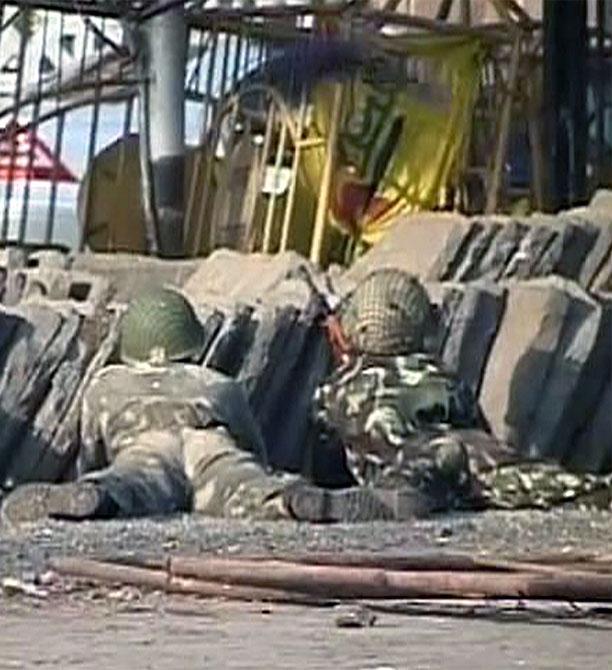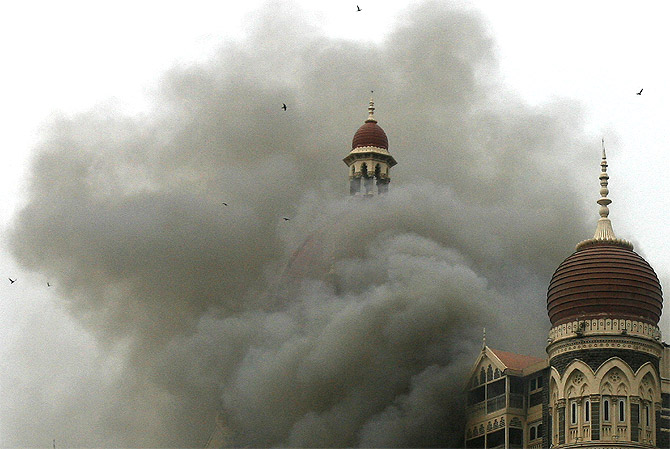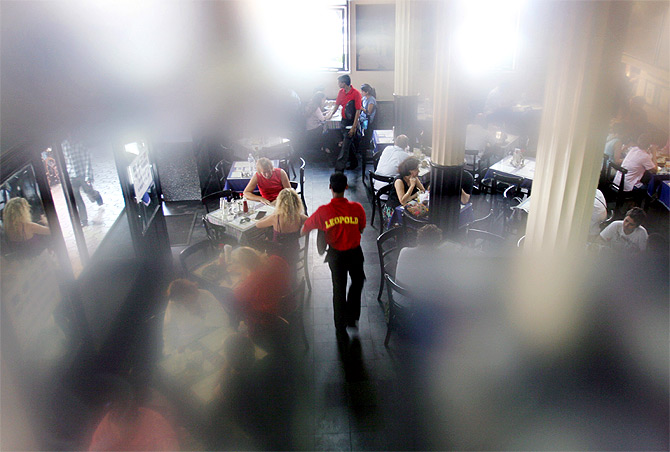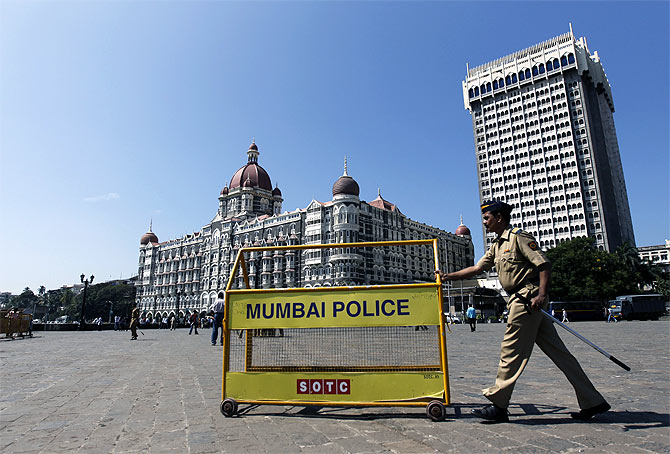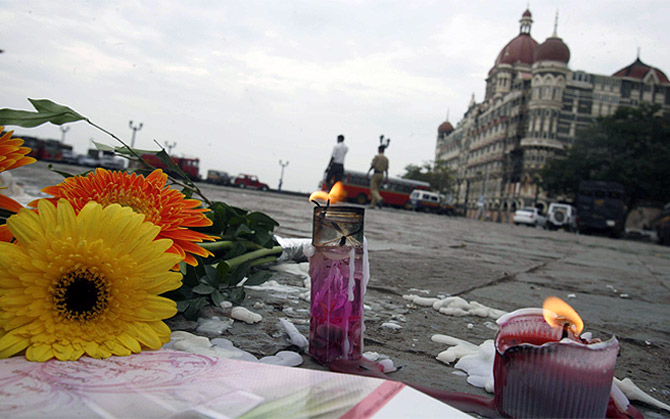 | « Back to article | Print this article |
'Terrorists started shooting the bus in which we were leaving'
Five years after the attack, 26/11 survivors share their stories of Mumbai's night of terror with Ranjita Ganesan and Indulekha Aravind
Security that day was lax at the Taj. A vase the Mangeshikars had taken for a wedding reception was not checked because they said it was a gift.
Suddenly they heard a noise that sounded like Diwali firecrackers. Mangeshikar, who had been in surgery the whole day and was hungry, said he'd go down from Crystal Room (the banquet hall) and eat at Shamiana (the coffee shop) but one of the guests told him not to since snacks were being brought up.
The firecracker noise started again while they were eating. A waiter told them that it was a gang war, and then, within seconds, that some terrorists were coming in and that it was better to run away - and he locked the doors to Crystal Room .
The glass on the doors was shattered by bullets, one of which whizzed past Mangeshikar's shoulder as he dived down. The people inside Crystal Room were then led through a service passage by the hotel staff. The gunmen started shooting from overhead, from the swimming pool area.
The guests at Shamiana had fallen to their fire. Mangeshikar's decision not to go down to snack saved him. All the guests were then taken to the Chambers.
At 1:30 am, Mangeshikar says, the police came to rescue "privileged" people like members of Parliament. They used the corridor into Nalanda, the bookstore, from where there was a service passage through which the people could have escaped.
Others were led in the direction he had come from. "I tried telling people not to go that way because the gunmen were in that area. But nobody listened, and 20 to 40 of them were gunned down," says Mangeshikar.
At 9 am, the commandos came in and rescued the Mangeshikars, almost 12 hours after their ordeal began. But that wasn't the end of their travails.
"I panicked when the terrorists started shooting the bus in which we were leaving," says Mangeshikar. "They were shooting blindly -- you could hear the sound, and see the bullets hitting the body of the bus."
He says he doesn't really keep thinking about the incident, though he can recall all the details.
"I'm used to the sight of blood because I'm a doctor. But immediately after I came back, any loud sound, even that of a door shutting loudly, would remind me of the explosions."
He still isn't convinced that security at airports and hotels has become foolproof after the attack. "All checks are just eyewash."
Prashant Mangeshikar
Surgeon
'I began waiting - for the end'
Mansukhani reached the Taj with his mother, Indira, at 9.25 pm to attend the wedding reception of a friend. Instead of waiting in the lobby, he managed to convince Indira, who does not approve of alcohol, to accompany him to the first-floor bar for a drink.
Moments later, they heard what sounded like firecrackers from downstairs. People on the ground floor had been shot. The Taj staff swiftly ushered people into rooms and bolted them in.
Unaware that the ordeal was caused not by local gangs but by terrorists, some of Mansukhani's friends contemplated taking the party elsewhere later that night.
From various rooms, guests were brought through service corridors to the Chambers. Information was flowing thick, fast and murky. Mansukhani called journalist friends to find out the details and lied to his father, who was abroad at the time, that they were home.
"Many people had phones, which actually caused panic," he recounts.
Someone had the presence of mind to unplug the TV. Later, Mansukhani took away his mother's phone. For the rest of the time, she prayed silently. At around 3 am, an evacuation was attempted.
By then, says Mansukhani, media reports had given the gunmen a whiff of the hideout. Two batches were evacuated successfully but the third was met with a hail of bullets, causing people to hasten back.
Mansukhani lost hope. He sent SMSes to close friends saying he wasn't going to make it.
"I began waiting not to be rescued, but in another sense -- for the end."
Eventually, they were rescued.
Five years later, Mansukhani still feels survivor guilt and trauma. The approach taken by some therapists has left him disillusioned.
"They tried to make me think it was not as bad as I remembered," he says. Eventually, Mansukhani says he would like to counsel people in similar situations.
Bhisham Mansukhani
Journalist
'I was next to a bed with two bodies'
Mishra was in Cafe Leopold, having dinner with two friends, when there was a small explosion at the table in front, which he took to be a birthday celebration.
"Then I was hit by something. The next thing I remember is getting out of the restaurant. Shots were being fired from two of the doors, so I got out from a third," he says.
"I did not see the terrorists but I remember the sound of machine-gun fire and I knew there was a lot of blood oozing out."
When Mishra got outside, people refused to help. He had pushed his way into a car but the man inside threw him out.
Finally, Kishore Pujari, who Mishra calls his guardian angel, hailed a taxi and took him to St George Hospital which happens to be next to the Chhattrapati Shivaji Terminus, the site of another attack.
Mishra was the first victim to reach the hospital.
"They refused to admit me, thinking I had been injured in a gang war, and left me to wait on the stairs. Then a senior doctor rushed in and told them their job was to save my life, not discuss whether or not to admit me," Mishra remembers.
Since the doctors were free then, they were able to remove the bullet lodged just below his shoulder. Within 10 minutes, the other victims started coming in, and the magnitude of the attack began to dawn on the hospital staff.
"It was a very depressing time," says Mishra. "I was next to a bed on which two people were dead and, soon, a third also died."
Then, someone said the hospital may be the next target after Cama Hospital. Mishra and others were then shifted to JJ Hospital.
For a year after that, Mishra tried to avoid crowded places like malls and stations.
"Then I learnt to accept things because when you stay in Mumbai, you can't be so choosy. The incident completely changed my perspective about life. Small things no longer frustrate me, and I do not put myself under pressure," he says. "I now live life from one day to the next, doing things at my own pace."
Sourav Mishra
Former journalist
'It's the same sense of outrage'
Vajpeyi was having dinner with friends at the Golden Dragon restaurant in the Taj.
"I don't know, if my visits to the two hotels, very regular in the old days, but now much less so, are due to a reticence to visit as a result of the experience of being a victim of the terrorist attack, or just a natural corollary of Nariman Point gradually losing some of its significance to Bandra-Kurla, Lower Parel and Worli," he says. "I guess it's a mix of both."
As it happens, over the last few days he has been to the Taj Chambers for a meeting, the Taj Ballroom for a book launch, and the Oberoi for dinner.
"At each visit, the mind still dwells back to five years ago, in a macabre sense at the Taj, to recounting and retelling the story - from the early rat-a-tat of the gunfire, to hiding under the dinner table, to crawling across the restaurant, through the kitchen, up a staircase, through back passages, into the Chambers," says he.
"And then in the Chambers, the imagery of people, cramped together, some crying, some jostling for space, almost all cringing when the frequent blasts went off loudly, trying to find shelter behind solid walls and columns away from the glass plates looking out into the first floor terrace and then across the harbour."
Vajpeyi remembers the outrage after the attack which induced people to mobilise an agenda of cleaner politics and a cleaner public India.
"Much of it has dissipated. My own sense of commitment then, to engage much more with the social sector as a result of my experience, has reduced a bit over time, although still far more than before the attack," he says.
"Now, however, my mind goes back to the sense of the same outrage and shames it into reformulating that state of mind."
Alok Vajpeyi
Investment banker
'The impact was there for a very long time and it still comes back'
Just hours before the crisis, Sinha had been shopping for a new lampshade with his wife after finishing work early. When he sat down for dinner around 9.30 pm, the phone calls started. Sinha rushed to the Taj to assess the situation, calling for back-up and roadblocks.
Later, fellow police officer Vishwas Nangre Patil arrived and together they stepped inside.
The many spent rounds of AK-47, the number of corpses strewn in the lobby and the fact that the gunmen had stayed back in the building told them this was no ordinary gang war.
Beyond Crystal Room, Sinha was unfamiliar with the hotel's layout. There were eight policemen inside. Others were stationed at the various exits. Sinha, armed with a revolver, and Patil stationed themselves in the CCTV surveillance room to monitor the gunmen.
Each time it seemed like the gunmen were going to kill more hostages, the cops distracted them with gunfire. Eventually, the team had to abandon the surveillance room as they sensed the terrorists had decided to blow it up.
Outside the surveillance room, Sinha and Patil were fired at by the gunmen but they managed to escape to the first floor. The rest of the policemen ran back towards the surveillance room; two of them were gunned down.
"In any battle, you always have to move forward. If you go back, you get killed," says Sinha who fractured his ankle that night.
Still, they stayed on in the hotel and engaged the terrorists for about five hours until the commandos arrived. The operation was riddled with challenges.
"The lights were flickering. The fire had also set off sprinklers which created a smog-like air." Disappointment often haunts Sinha. "The impact was there for a very long time and it still comes back. Particularly, the feeling that we were not able to kill them," he says.
"Perhaps we could have got them had we entered with better preparation."
Rajvardhan Sinha
Police officer
TOP photo features you missed last week
Click on MORE to see another PHOTO features...</P
